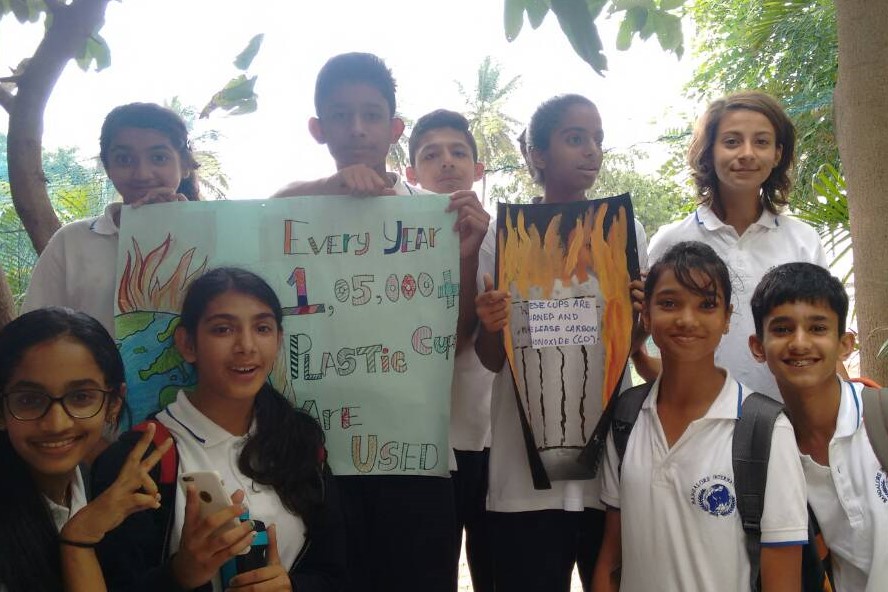Bangalore International School’s War on Waste
Posted: 10 August 2018

Small changes can make a big difference, as Bangalore International School has found in its war on waste. From reducing food waste to tackling plastic over-use, Padmaja Murari Thayi talks through a number of small initiatives have resulted in a more mindful environmental culture within the school.
Author and position: Padmaja Murari Thayi, Round Square Coordinator, Head of the Learning Centre and Maths teacher
School: Bangalore International School describes itself as a ‘small school with a large heart’ serving 600 boys and girls aged 3-18. It was the first international school to be established in Bangalore and remains culturally diverse.
Introduction
Bangalore International School was established in 1969 as an expat school offering an American curriculum. Since that time, the school has grown and with it, the pupil population. As student numbers increased, staff became more aware of the volume of food waste, which prompted us to look more closely at the use of resources within the school. The issue was championed by a team including the Activity Team, Student Team and the environment team (the CAS Team).
Activity
Attempts to curb food waste began very informally, with staff supervising the students’ eating at mealtimes, encouraging them to start with smaller helpings, then returning for more if needed.
When volumes remained high, it was felt that a stronger approach was needed. We decided to weigh the amount of food waste and share the amount with the students in assembly. After just a few weeks, we began to see an impact in the volume of food being wasted. The adult staff were very quick to change their habits but the students inevitably took a little longer! The food waste amount in grams is now shared every day with the pupils and banners appear in the dining half remining pupils, and teachers, of the importance of avoiding waste. Whilst we cannot eliminate food waste completely, we have looked at ways to recycle the waste that remains. ‘Wet waste’, for example, is now used as a food source for the pigs in our local area and organic fruit and vegetable waste is also used to make compost.
Another aspect that has helped our pupils think more deeply about food waste is our social service activity. Our students already mentor children at a neighbouring school but were sensitively encouraged at mealtimes to see the value that students in underprivileged communities placed on their meals, and to recognise the importance of not wasting this precious commodity.
In a more general sense, we shared educational videos about poverty and talked openly with the students about the situations families in less fortunate circumstances face; that there are parents who find it difficult to provide enough food for their children. The students watched resources including the documentary ‘Before the floods’ and the TED talk on Zero waste by Bea Johnson ( https://www.youtube.com/watch?v=CSUmo-40pqA).
As well as food waste, we took steps to tackle other areas where we felt resources were being wasted. One of these was power – we often found classrooms fully lit with no-one in them, or rooms left illuminated over the weekend when the students had returned home. To help highlight the scale of the problem, we began displaying on our noticeboards a list of rooms where the lights had been left on ‘wastefully’. This audit would be made by the Head of School as part of their usual rounds, so the report of ‘wasteful rooms’ would be taken seriously.
One other small but effective campaign was against the overuse of plastic. It had become common practice for students to come to school with non-biodegradable plastic bottles as our hot climate means that hydration is vital. Within school as well, we would often give students plastic cups with water in to keep them hydrated. Now, we have water coolers in every corridor and students are asked to bring in cups from home rather than buying new water bottles each time.
Our Middle School environment club volunteers continued our work creating promotional materials to raise awareness of plastic overuse. Charts and slogans depicting the ill effects of plastics were put up in places where evening drinks were provided and after two weeks, the students noted a significant reduction in the usage of plastic cups.
The students identified other areas of plastic waste, such as the use of plastic bags by the school’s book store and uniform store. They asked the school management for packaging alternatives and it was agreed that new batch uniforms and books would be distributed in cloth bags instead.
Our ‘war on waste’ has even influenced how we manage the risk of malaria. Rather than using powerful anti-mosquito chemicals, often in non-recyclable containers with harmful toxins to the environment, we now use organic alternatives, such as eucalyptus leaves.
Challenges
- Girls and healthy eating – An important consideration for us in highlighting food waste was to avoid an over-consciousness about eating, particularly among students with a sensitivity to their weight. We have a nutritionist in the school who works with the students to help them understand how to make healthy choices, that portion control is not the only way to ensure healthy nourishment, and that they should not leave a meal feeling hungry.
- Behaviour change – It was not easy to get the children to change their habits. We liberally used awareness posters around the school and ensured that assemblies regularly addressed the subject of waste.
We also had to help parents understand and feel confident in our choices, particularly in our decision to take an organic route for mosquito repellent. They were appeased, however, by the fact that we had a clear routine and process in place to ensure the safety of the students.
Impact
Despite the fact that our pupil numbers continue to grow, our food waste has not grown to the same extent. From two overflowing waste bins, we have now cut our waste down significantly. In a single month, our average weekly food waste has often been reduced by a third (and sometimes even halved) by sharing with the pupils and staff the amount of food waste at the start of each month.
Our power audits have been very effective in reminding people to pay attention to this area. Singling out examples of where this has not occurred helps us all feel a responsibility for changing our habits. Before focusing on this area, we had a minimum of 6 rooms (classrooms, labs and staff rooms) with lights or fans on during or at the end of the day, despite no-one being present in the room. Within two months, we had ensured that not a single room was left unattended using electricity wastefully.
The volume of plastic cups has also reduced from an average of 450-500 plastic cups a day to less than 200 plastic cups.
The Future
We will continue to look at ways to eliminate waste on our campus, despite the fact that this is still an area of development in Bangalore itself. It is not uncommon in our neighbourhood for wet waste to be disposed of in open areas, which can breed disease, and dry waste collections are still in their infancy. We remain committed to exploring all areas of waste reduction and will continue to educate the pupil and staff populace as each year goes by.
Advice
- Be vigilant – Use the downtime opportunities in the school day and duty periods to have conversations with pupils and staff who may need reminding or personal guidance about their habits.
- Get the support staff
- involved – Make sure that support staff, the catering team, facilities and ground staff, are mindful of the initiative, to help the pupils act responsibly in these areas.
- Watch out for pupils who fall through the net – Be sensitive to pupils who may have other reasons for not following your guidance, or go too far in exercising it. For example, as well as making sure that the students do not waste food, we ensure that they also eat well. Students are asked at random what they have eaten and it’s often easy to identify those that have not – sometimes they just want more playtime!
